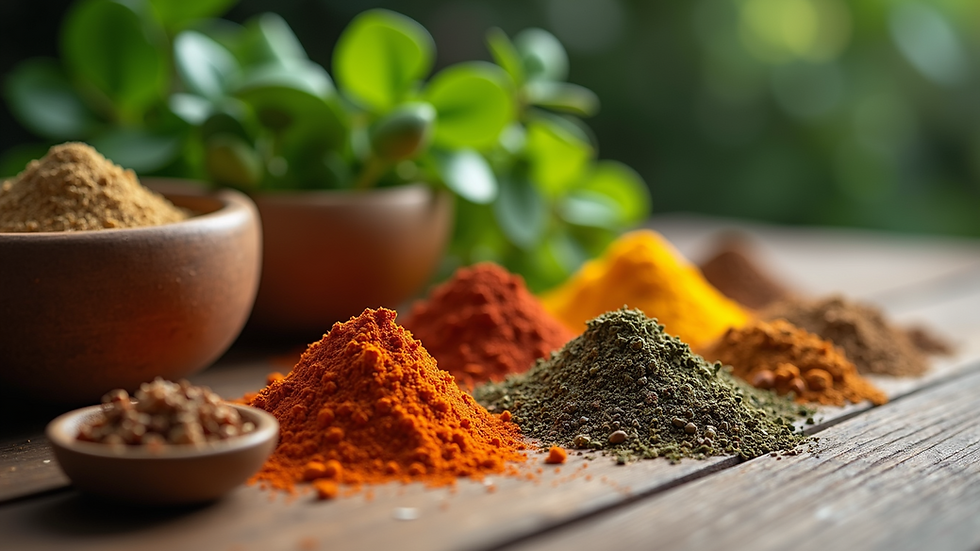The Role of Herbal Remedies in Ayurvedic Wellness
- prexim
- Jul 14, 2025
- 4 min read
Ayurveda is an ancient system of natural healing that originated in India over 5,000 years ago. At its core, Ayurveda emphasizes the balance of body, mind, and spirit. One significant aspect of this holistic approach is the use of herbal remedies. These remedies not only aim to treat ailments but also promote overall wellness and longevity. In this blog post, we will explore the various roles of herbal remedies in Ayurvedic wellness, offering practical insights and recommendations for integrating them into your life.
Herbal Remedies: A Core Component of Ayurveda
Herbal remedies are pivotal in Ayurvedic treatments. They are derived from various parts of plants, including roots, leaves, and flowers, and are used to create tonics, teas, and powders that support health and healing. Ayurveda classifies these herbs based on their properties, tastes, energies, and the specific health benefits they offer.
For example, Tulsi (Holy Basil) is revered in Ayurveda for its adaptogenic properties. It helps the body adapt to stress and supports the immune system. Ashwagandha, another popular herb, is known for its ability to reduce anxiety and improve energy levels. Such remedies are not just about addressing symptoms; they work to heal the underlying imbalances in the body.

The Science Behind Herbal Remedies
While herbal remedies have been used for millennia, modern science is beginning to validate many of these ancient practices. Numerous studies show that herbs can have significant effects on health. For example, the use of Turmeric (Curcuma longa) is well-documented for its anti-inflammatory properties, primarily due to its active compound, curcumin.
Furthermore, research has revealed that Ginger can aid in digestion and reduce nausea, while Neem has antibacterial and antiviral properties. These findings highlight how integrating herbal remedies into daily life can bring substantial health benefits, which aligns with the holistic approach of Ayurveda.

Do Ayurveda Products Really Work?
One common question surrounding Ayurvedic practices is whether they are genuinely effective. The answer often lies in individual experiences and scientific studies. Many people report significant improvements in their health after incorporating Ayurvedic herbs into their regimen.
For instance, a study published in the journal Evidence-Based Complementary and Alternative Medicine found that participants with chronic joint pain experienced reduced symptoms after consuming a combination of Ayurvedic herbal supplements. This indicates that these remedies can effectively alleviate specific health concerns.
Moreover, Ayurveda focuses on personalized treatment. The same herb can produce different outcomes for different individuals based on their unique body constitution (doshas). This tailored approach enhances the effectiveness of the remedies, making Ayurvedic products a valuable addition to your health journey.

Practical Ways to Incorporate Herbal Remedies into Your Daily Life
Incorporating herbal remedies into your daily routine can be straightforward and enjoyable. Here are some practical tips to get you started:
Herbal Teas: Start your day with a cup of herbal tea. Opt for blends that include herbs like Peppermint for digestion or Chamomile for relaxation.
Add Spices to Meals: Use spices such as Turmeric, Ginger, and Cinnamon in your cooking. Not only do they enhance flavor, but they also provide health benefits.
Tinctures and Extracts: Consider using tinctures or liquid extracts of herbs like Ashwagandha or Holy Basil, which can be easier to incorporate into your routine.
Supplements: If you prefer a more standardized dose, look for ayurvedic herbal supplements that can be conveniently taken in capsule form. For high-quality options, check out ayurvedic herbal supplements.
Essential Oils: Utilize essential oils derived from Ayurvedic herbs. For example, Lavender oil can help with relaxation, while Eucalyptus oil can aid respiratory health.
Integrating these practices can help you experience the benefits of herbs as part of a comprehensive approach to wellness.
Understanding Doshas: Tailoring Remedies for You
An essential component of Ayurveda is the concept of doshas, which refers to the three primary energies in the body: Vata, Pitta, and Kapha. Each dosha has distinct characteristics and governs particular functions of the body.
Vata is associated with air and space. People with a dominant Vata dosha may suffer from dryness, anxiety, or digestive issues.
Pitta corresponds with fire and water. Those with a Pitta constitution may struggle with inflammation, acidity, or irritability.
Kapha is linked with earth and water. A Kapha imbalance can lead to weight gain, lethargy, or congestion.
Understanding your dosha is crucial for choosing the right herbal remedies. For instance, someone with a Pitta constitution may benefit from cooling herbs like Coriander and Mint, while a Vata person might find relief with warming herbs like Cinnamon and Ginger. Consulting with an Ayurvedic practitioner can help you identify your dosha and choose the most effective herbs for your unique needs.
Final Thoughts on the Role of Herbal Remedies
Herbal remedies remain a fundamental aspect of Ayurveda, offering natural, potent solutions for a variety of health issues. By understanding the types of herbs available, their properties, and how they can be integrated into daily life, you can enhance your wellness journey.
Embracing Ayurveda is not just about consuming herbs; it's about cultivating a lifestyle that values balance, prevention, and overall health. From dietary adjustments to mindfulness practices, integrating herbal remedies can be part of a broader commitment to achieving harmony within your body, mind, and spirit. So, take a step toward holistic wellness today and explore the rich world of Ayurvedic herbal remedies.
With the right knowledge and practices, you can harness the power of nature to improve your health and well-being.




Comments